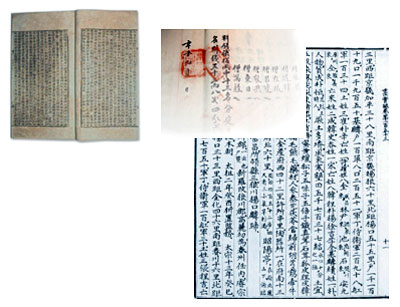Joseon Wangjo Sillok, Annals of the Joseon Dynasty
 | ||
Joseon Wangjo Sillok, Annals of the Joseon Dynasty is a historical document covering 472 years (1392-1863) of the history of the reigns of 25 kings, from the dynasty? founder King Taejo (1392-1398) to King Cheoljong (1849-1863), the third to the last king. The last two kings Go Jong and Soon Jong's sillok were written under Imperial Japanese rule and thus are not included. In chronological order, the king? everyday affairs, court functionaries?everyday reports and other daily matters dealt with in the public offices are compiled in 1,893 chapters in 888 books. Sillok covers subjects such as politics, diplomacy, society, economy, education and religious life, as well as geography, music, scientific facts and foreign relations in Northeast Asia. It is the longest continuous historical record in the world and the preservation of the entire work is unprecedented.
The process through which this Joseon Annals were recorded is particular. First, they were written in method of Pyun-nyun, chronological form, which means the writing in order of years and months. Most of the other historical records were written in method of Gi-jeon, where facts were divided into theme, such as economy, environment or legislation. The benefit of Pyun-nyun is that it is comfortable to research the characteristics of each king. Another characteristic the Sillok have is that the record each king was started after the death or retirement of said king. The rule was to keep the Sillok from being searched or seen by the king who is the main topic. Only the writers could write and read, so it was easy to maintain the objectivity of records. "The conditions of being chroniclers of Sillok were very austere. To be chroniclers, not only did they have to pass the state examination, but they also had to have good relationship with companions and get married. In addition, family members or relatives had to be insensitive to bribes" explains Prof. Choi Yoon-oh(Dept. of History)
Today, movements for preserving and publicizing the annals are very active. On March 3, 2006, "The Committee of Redempting Joseon Wangjo Sillok" was founded to demand Japan to return the rest of Sillok, saved in Tokyo University National Library. The members of committee are negotiating with Tokyo University. Also, National History Compilation Committee maintaining an internet site that where the Sillok is organized comfortably so that the common user can research quickly. Everyday, about 10,000 to 20,000 visitors search the site.
"In Sillok, we can discover 500 years of long and brilliant human socty and culture. More precise research of Sillok is needed." Like Choi says, although the record heritages are precious, they become real treasures when they are translated and publicized in modern society. In reality, drama Deajang-gum and movie The King's man got their motive from a few lines of Joseon Wangjo Sillok. It means the old record of Korean History can be marvelous cultural contents for producing new cultural materials.. As these struggles for preserving persevere, Sillok will be maintained as the masterpiece of record eternally.

